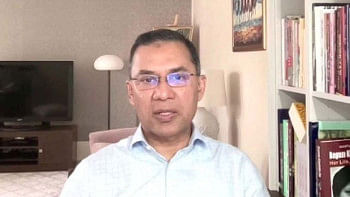Tweedledum and Tweedledee
THE AL's 20th National Council was already on the cards. It was going to take place after an unusual hiatus of seven years. It was a difficult time, packed with equally unusual events. Obviously, the council raised a great deal of curiosity both among the public and the party men. The media-savvy Awami League adequately drew the attention of media outlets, which, alongside romanticising the party as the catalyst of our history's big events, dutifully collected the views of a cross-section of public as to what their expectations were from the council. In response, there has been an apparent clamour for a new leadership to emerge from the historic occasion. Has that been achieved?
The outcome of the council could be foretold from the way the events were unfolding. Yet, Sheikh Hasina, who leads the government with a comfortable majority in the parliament, could have dispensed the president's post to someone else -- new, fresh and more energetic -- instead of holding it for the sixth time. But that cannot happen in power politics, more so in a country when both are complementary to each other. Any ambitious leader would like to hold all the levers of power of power in his or her hand. Therefore, in a strictly stage-managed exercise, she was "elected" the party president without any dissent, debate or free expression of views -- the absence of which is the first syndrome of an authoritarian mold.
Failures lead one to ensure a firm grip on everything that comes her or his way, more so when a huge parliamentary backing, which is also indicative of public support, fails to produce results in controlling law and order or unruly traders. As a result, public dissatisfaction piles up, pushing the power wielders to respond to the problems clumsily. The insult meted out to poor Abdul Jalil through his unceremonious exit, or Sohel Taj's mysterious resignation, were avoidable. A nice send-off to Jalil would make the AL's rich tradition richer, and the presentation of brass tacks on the minister of state for home could spare the nation worrisome speculations.
On assumption of AL's presidency Sheikh Hasina, in her cliche-packed 45-minute speech, propounded many pious words. She had done the same when she assumed power in January last. But the conduct of her party activists belies what she says, or, for one reason or another, she has failed to control them. And the mayhem continues ad-infinitum. Yet, power and influence make a heady brew, intoxicating one who tastes it. That's the reason the prime minister couldn't stick to her unwillingness to bear the burden of the AL presidency. Within moments, she was back in form and forgot that she had politely refused to shoulder the burden of the AL presidency any more. Nevertheless, the six-time president of the Awami League looked stale.
The Awami League has always been in its elements when in opposition, but more often than not bungled in government. In just a little over six months, the AL government faced the Pilkhana tragedy, the unrest in the garments sector, a new challenge regard maritime delineation, the return of immigrant workers in droves, and the large-scale smuggling during the BDR reorganisation. These are apart from corruption, the broker-based administration, property-grabbing, murder, dacoity and extortion.
The festivity seen in the Bangabandhu International Conference Centre (another trivialisation of the hero?) as well as the celebratory mood of the government may fade soon as we start dealing with issues like border, trade, water, and so on, with India, which has taken us for granted ever since the AL came to power. During her last stint in government, Sheikh Hasina showed pragmatism by holding back on some of the sensitive issues on India's wish-list. The country is nervously awaiting her intervention, while some of her minister have been talking irresponsibly on the same issues.
In the meantime, the quest far a new AL leadership has resulted only in a Tweedledum and Tweedledee situation, although optimism is alive as its fruition.

 For all latest news, follow The Daily Star's Google News channel.
For all latest news, follow The Daily Star's Google News channel. 



Comments